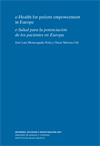 José Luis Monteagudo Peña, Oscar Moreno Gil
José Luis Monteagudo Peña, Oscar Moreno GilThe content of this monograph is the result of tasks performed in the context of the eHealth ERA project funded under the EC Information Technologies for Health activities of the EU Sixth Framework Programme. This monograph reviews the state of eHealth applications serving to enhance the role of the patients in the healthcare context. The study has been based on a quite broad collection of practical implementations across Europe. One of the first tasks has been to build up a taxonomy allowing a systematic analysis of the cluster of eHealth applications for patient empowerment.
The cumulated experience has allowed to produce a fist analysis of the situation state and the persepctives of evolution as well as the opportunities for Euroepan cooperation in this field. By the own nature of the matter object study, the document do not pretend to be self closed but to serve as a base for further discussion and fotr the creation of critical thinking on the role of the ICT in the future healthcare, particulary regarding patient empowerment in the general framework of the eHealth deployment following the i2010 strategy in Europe.
Download e-Health for Patients Empowerment in Europe (.pdf, 602 KB).
Download from the eHealthNews.EU Portal's mirror: e-Health for Patients Empowerment in Europe(.pdf, 602 KB).
Related article:
- FP6 Projects: eHealth ERA